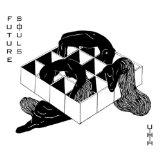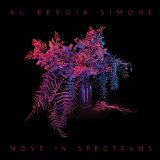 The third album by LA-based female duo Uh Huh Her is meant to be their concession to dance music, not that you couldn’t play their previous material in a club but “Future Souls” is intended to take you further into the realm of abandoned dance floor hedonism. Camila Grey and Leisha Hailey should be congratulated for showing restraint and not making the EDM-polluted monstrosity that this could have been. It doesn’t chase trends and there are no David Guetta or will.i.am attempts at shoehorning six different sub genres into a four minute track. But then Uh Huh Her haven’t really made a dance record here at all. This album is in fact more of a continuation of their elegant, electro-pop sound but with considerably more electronics and fewer guitars. Whether it has reinforced and strengthened their position in a very crowded and ambitious arena will be mainly dependent on their songwriting skills and ability to establish a more defined personality – something they have struggled with before.
The third album by LA-based female duo Uh Huh Her is meant to be their concession to dance music, not that you couldn’t play their previous material in a club but “Future Souls” is intended to take you further into the realm of abandoned dance floor hedonism. Camila Grey and Leisha Hailey should be congratulated for showing restraint and not making the EDM-polluted monstrosity that this could have been. It doesn’t chase trends and there are no David Guetta or will.i.am attempts at shoehorning six different sub genres into a four minute track. But then Uh Huh Her haven’t really made a dance record here at all. This album is in fact more of a continuation of their elegant, electro-pop sound but with considerably more electronics and fewer guitars. Whether it has reinforced and strengthened their position in a very crowded and ambitious arena will be mainly dependent on their songwriting skills and ability to establish a more defined personality – something they have struggled with before.
An interesting reference point here is girl group All Saints, produced by William Orbit; very occasionally the quality comes closer to Orbit’s definitive work with Madonna on “Ray of Light”. It has a late 90’s naiveté both vocally and sonically, which can sound undernourished but can also shine and warm through with harmonies that can swell up unexpectedly, from an intro for example. And there are some good songs here too. Album opener “Innocence”, for example, creates a steady impression and beneath a lightly bouncing acid house synth motif the melodies morph into something smooth but sticky; it’s a surprise when it finally clicks. “Bullet” has a nicely thought out structure and nagging chorus and “Time” sounds a bit like a highly-polished Wendy and Lisa.
For a dance album it’s maybe surprising that the two best songs on “Future Souls” are the most introverted and intimate. “Strange Design” is both nurturing and arms-length, slowly spinning and calm with an obvious deb to the spooked and lush ballads of “Supernature”- era Goldfrapp. “Interconnect” is satisfyingly bolshy, with a cool and confident vocal but it’s still as considered and graceful as anything you would come to expect from the duo’s best material. And that is what reinforces the frustrations experienced elsewhere within the ten tracks found here. The evidence that the band can push themselves to make something memorable and compelling is often undermined by pleasant by completely disposable filler such as the auto tuned cliché of “It’s Chemical” and the thinness of “Nuthin Without Your Love” could be any one of an army of faceless electronics acts.
Uh Huh Her have a sizeable cult following that is undeniably linked to Leisha Hailey’s performance as Alice Pieszecki in the garish but often riveting series, The L Word. Hailey was the only out lesbian playing a lesbian in a show about lesbians. Her character was charismatic and spiky and in many ways the show’s moral compass – if only some of that character’s utter self-possession could be transposed to the duo’s musical ventures. Au Revour Simone, Chvrches and School of Seven Bells should be Uh Huh Her’s synth sisters in crime but where those female lead, synth-preoccupied groups each have an identifiable sound, UHH still suffer from a stranded sense of identity. This could be avoided if, instead of relying on self-production, the women allowed themselves to be guided and pushed by another studio professional. Although “Future Souls” is competent enough, let’s hope that the next album is the one that fully reveals the duo’s idiosyncrasies and tics in ways which are still only hinted at here.
So, how was 2013 for you? The Riot Squad have had a brilliant year bringing you the best in contemporary music wherever we find it. Allan, John, Klare and Louie have reviewed some exceptional live and recorded music throughout the year and we all thank you for reading our reviews and looking at our photos. We couldn’t resist this opportunity to remind you of some of the artists we reviewed for the first time in 2013.
We saw live performances by the Emile Gerber Band (which became Stoneface Travellers), Henrik Freischlader, Josephine, Marcus Bonfanti (solo and with his band), The Kennedys, Federal Charm (twice), Black Casino & The Ghost, Coco and the Butterfields (several times), The Dirt Tracks, Carrie Rodriguez, Aynsley Lister, Civil Protection, Wheatus, Dean Owens and Zoe Schwarz Blue Commotion. Quite a selection, really.
We reviewed albums and singles by Henrik Freischlader, Marcus Bonfanti, Sally Shapiro, Tomorrow’s World, Black Casino & The Ghost, Jimmy Livingstone, Austra, Tess of the Circle, Aynsley Lister, The Nyco Project, The Dirt Tracks, Nadine Shah, Sullivn, Radio (in my) Head, Tal National, Layla Zoe, Kinver, Au Revoir Simone, DENA, Hartebeest, Polly Scattergood, Glasser, Annie, Emika and John Grant and probably a few others as well. Along the way we had some great fun and met some lovely people; you all know who you are, and we’re hoping to meet most of you again this year.
Looking forward to 2014, we’re hoping for more of the same. The review copies are already coming in and it’s starting to look pretty good already. Over the next few weeks, we’ll be sharing some of our predictions for 2014 from the Riot Squad and possibly from a few guest contributors as well. And, while we’re on the subject of guest contributions, many thanks to Aynsley Lister, Steve Jenner, Marcus Bonfanti and Billie Ray Martin for their contributions to our High Fives feature last year.
 American synth trio Au Revoir Simone have stepped out from the shadows a little on “Moves in Spectrums”, their fourth album in a decade. They were never a dark band, don’t let the adoration of superfans like David Lynch confuse you, but they were introverted and their sound straightforward in its small way where basic electronics meshed with sympathetic but independent, occasionally folky female leads. The trick was that little thorns would stick and cut occasionally if you weren’t careful and sadness would completely dominate and then just evaporate. It was this that made them special and why so many would always come back for more of something that they couldn’t quite put their finger on.
American synth trio Au Revoir Simone have stepped out from the shadows a little on “Moves in Spectrums”, their fourth album in a decade. They were never a dark band, don’t let the adoration of superfans like David Lynch confuse you, but they were introverted and their sound straightforward in its small way where basic electronics meshed with sympathetic but independent, occasionally folky female leads. The trick was that little thorns would stick and cut occasionally if you weren’t careful and sadness would completely dominate and then just evaporate. It was this that made them special and why so many would always come back for more of something that they couldn’t quite put their finger on.
Over the course of three albums Au Revoir Simone had gone from their relatively lo-fi, cheapo keyboard aesthetic to something far more expansive and expensive without ever compromising what is essentially their sound. Their last “The Bird of Music” was in many ways their most experimental but almost their most whimsical; it had more sonic clout than the previous two releases but it was also hard to escape the feeling that three albums from the trio may be enough. “Moves in Spectrums” goes some way in proving this hunch to be somewhat short-sighted and premature. Opening track “More Than” with its menace and prowl and dominant drum pattern and droning synth has only the bright harmonised chorus that reveals the band’s identity and it sounds great. “The Lead is Galloping” with its interestingly reversed, request hook of ‘Nobody put your hands up’ is a lolloping, sarcastic low self-esteem anthem and both “Just Like a Tree” and “Somebody Who” (featuring some all too brief but totally gorgeous cowbells) plunder satisfyingly rich-sounding, 80’s electro chart pop. Swirling and ‘ha-ha-ha-ha’ voiced “Boiling Point” is a commendable homage to Laurie Anderson and “Crazy” has the most incredible use of synths as if they were guitars that you will have heard for a while.
There are some odd decisions made here though and this is something all of Au Revoir Simone’s previous albums suffer from; plonking a track in, three in this case, whose inclusion seems to make little sense to anyone other than, I presume, the band themselves. Personal songs or experimentation are one thing but “We Both Know” is a very boring, almost five minute, semi-instrumental that goes nowhere, vocals popping up in the last minute and a half to be forgotten forever. “Love You Don’t Know Me” is that one line repeated over a minor MOR electronic keyboard melody for three minutes and album closer “Let the Night Win” although superficially vibrant, is not exactly captivating. It’s almost a complete certainty that the band have better material but they’ve decided that these tracks are the ones that should be heard; it’s frustrating and feels oddly self-indulgent.
“Moves in Spectrums” is an album where the good is some of Au Revoir Simone’s best and the average is still present. Every album has been more interesting than the last and this is their most cohesive in many ways and certainly the most assertive, a much needed attribute that the band required to move forward and to avoid the sometimes all too appropriate ‘nice’ tag. They are currently one of only a few female groups making this particular type of warm, slightly eccentric electronic music and therefore the competition may not be great but they do still lead in their genre. The feeling now though is whether Au Revior Simone can find that one brilliant album that they surely have in them as sadly, despite the very strong opening, this isn’t it.


